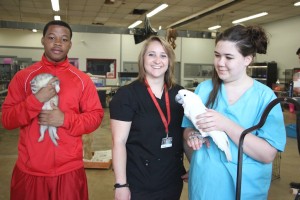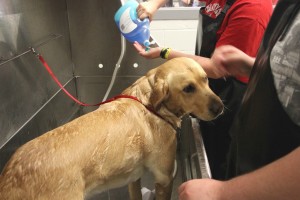
Editor’s note: The Ohio FFA Convention recognizes students for their accomplishments as a part of the Ohio FFA association. The 2016 Convention will take place May 5 and 6, at the Ohio State Fairgrounds in Columbus, and a couple chapters in our readership are receiving some big awards this year.
The South Stark Career Academy, in Canton, is recognized as a new chapter and Firelands FFA chapter, in Oberlin, has three star finalists and eight proficiency finalists (look for story May 5).
CANTON, Ohio — “Who would have thought you would get to work with a skunk during school?” asked Lexi Baer, a junior in the new small animal sciences career tech program at the South Stark Career Academy (SSCA) in Canton.
Steve the skunk, Ghost the cockatoo, a couple of playful ferrets, chameleons and bearded dragons are just some of the animals students take turns caring for at the Hayden Career Technical Annex, part of the Canton South High School campus.
Career goals
Samuel Muhammed prepares a treat for the rats by adding some peanut butter to a toy the rats can play with. Once he drops it into the cage, one of three greedy rats snatches the toy up and runs to the opposite side of the cage. Muhammed says the class has been beneficial in helping him to understand animal psychology and anatomy. He wants to pursue a career in marine biology or zoology.
A few steps away, Alaynah Richards is keeping Steve the skunk company as he plays with a small toy just like a cat would. “I didn’t know what I wanted to be when I took this class,” she said. After having a wildlife biologist come and speak to the students, Richards decided she would like to pursue a career as a conservationist or wildlife biologist.
“We have over 40 animals here,” said Lindsey Brant, class instructor. And it’s the very first year for the program.

First year
SSCA director Krista Husser approached Brant about the program, knowing her background and connection with the school. A lot of the technical programs that deal with animals are geared toward veterinary science, said Brant. “I knew there was more interest in zoo and conservation.”
Brant, who taught biology at Canton South High School for the past five years, said this class “is a dream come true.” Brant has biology and zoology degrees, has worked at local zoos and places like Hawaii, Mexico and the Caribbean, studying wildlife and exotic species.
“With my background working with these types of animals and my passion for education … it was meant to be,” she said.
New chapter
This year, at the Ohio FFA Convention, May 5-6, the South Stark Career Academy FFA will be recognized as a new chapter. Brant admits the FFA program is new to her, and she is not entirely sure how her program will fit into the mix, but she feels the professional development and leadership opportunities will be beneficial to her students.
Some of the students participated in state career development events this year, and did well, she said. “We had a team place fourth in animal behavior and ninth in aquarium management. The kids loved it.”
One of the more beneficial things FFA teaches students, is the value of record keeping, which is something Brant feels will be good for her students. As a two-year program, she would like to incorporate a capstone research project for her seniors, something that would require a fair amount of record keeping.
“Next year, I would like to have someone from FFA come in and share what we can do (as a chapter),” said Brant. “We are trying to find our niche.”
Universal themes

Eric Stevensons, one of the only students considering a career directly related to agriculture, finds many of the concepts he learns in class can be applied universally to all animals. “This class has helped me to understand animal behavior,” which will be useful on his future cattle and beef operation he hopes to start.
Animal behaviors and husbandry, anatomy and physiology, and breeding and genetics are just some of the topics Brant has covered in her small animal sciences course. “We’ve done a lot in our first year,” she said.
Building a program
Many of the students Brant is teaching have been in her biology classes at the high school and have made it easy for her to build a program. “I ask them a lot: ‘What do you want to learn about? And what things do you want to do in the class?,’” she said.
“They’re a wealth of great ideas,” offering suggestions for changing up the lab, and animals they would like to work with. Students also volunteer to take some of the animals home to care for them over the winter, spring and summer breaks.
And over her summer break, Brant plans to spend some time shadowing a veterinarian so she is better prepared to teach those topics. Eventually, she would like to take the animals and her students to the local elementary and middle schools to teach children about wild and exotic animals.
“A lot of kids started this class hating reptiles and now they have switched their allegiance (from mammals to reptiles),” said Brant.









